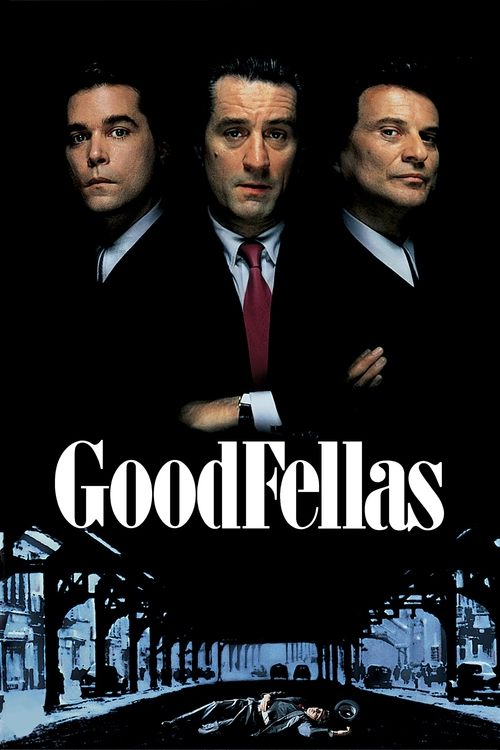GoodFellas

Plot
GoodFellas, directed by Martin Scorsese, is a gripping crime drama that takes viewers on a visceral and unflinching journey into the world of organized crime in 1950s and 1960s New York City. Based on the real-life story of Henry Hill, a mobster and FBI informant, the film masterfully weaves a complex narrative that is both a coming-of-age story and a cautionary tale about the allure and dangers of the Mafia lifestyle. The film opens with a montage of vignettes showcasing Henry Hill's (Ray Liotta) early life in Brooklyn's Little Italy, where he grows up in a tumultuous household with his half-Sicilian, half-Irish mother, Angie (Karen Wynne). As a young boy, Henry is befriended by the local mobsters, particularly Jimmy Conway (Robert De Niro), who takes him under his wing and teaches him the ways of the Mafia. Jimmy's guidance, fatherly advice, and eventual mentorship prove instrumental in Henry's rise through the ranks of the Lucchese crime family. Henry's early years are marked by a mixture of excitement, loyalty, and devotion to the mob. He witnesses Jimmy and his associate, Tommy DeVito (Joe Pesci), execute a relatively minor heist, which sets the tone for Henry's fascination with the world of crime. As Henry matures, he becomes increasingly disillusioned with his stagnant life and longs for excitement, status, and the spoils of a successful career in the Mafia. Jimmy, recognizing Henry's potential, encourages him to pursue a career in hijacking and truck driving, where they can make extra cash on the side. Henry's journey takes him from being an enforcer and driver to joining Jimmy Conway's illicit operation, where he watches as the profits roll in and the risks become increasingly higher. Under Jimmy's guidance, Henry becomes proficient in his role and earns the respect of his peers. However, his entry into the world of organized crime sets him on a path of deception, dishonesty, and isolation. Henry's relationships with his wife, Karen (Lorraine Bracco), and his friends and family members become strained as he becomes more deeply entrenched in the world of the mob. The third act marks a turning point in the film, as Henry faces escalating financial and personal problems. His friend and partner, Tommy DeVito, becomes increasingly erratic and volatile, prompting Jimmy to take drastic measures to contain the situation. Tommy's death, which takes place in a particularly gruesome scene, marks the beginning of a rapid downward spiral for Henry's life. His credibility with the mob is irreparably damaged, and he begins to lose the trust and respect of his associates. Meanwhile, Henry has grown increasingly desperate to avoid prosecution and financial ruin. He eventually turns to the only people who can offer him a chance to mitigate his problems – the FBI. Under the protection and guidance of prosecutor, Max Rosenberg (Chuck Low), Henry agrees to become an FBI informant, betraying his former associates and forgoing any chance at redemption within the mob. The latter part of the film unfolds with a series of events that further drive Henry's desperation. As Henry's life begins to unravel, the stakes escalate, and he becomes trapped in a web of deceit, anxiety, and paranoia. In the film's final scenes, Henry, now a marked man, attempts to stifle his anxiety about potential retribution from the mob while juggling his fractured relationships and precarious work life. Through the cinematic interpretation of Henry Hill's complex and tragic story, Martin Scorsese delivers a powerful and engrossing portrayal of the cyclical dynamics of organized crime. The film explores themes of ambition, loyalty, deception, loyalty, and consequences, shedding light on the grueling aspects of Mafioso life. With the exceptional performance of Joe Pesci, the intricate storytelling of Nicholas Pileggi, and the expert direction of Martin Scorsese, GoodFellas stands as an authoritative and profoundly unsettling expose of a Mafia life, as seen through the tumultuous eyes of its most devoted protagonist, Henry Hill.
Reviews
Steven
A perfect score for the busiest Ray Liotta in the world, Joe Pesci who said "fuck" over a hundred times, Robert De Niro's coolest and most dazzling close-up starting at 1 hour 38 minutes and 14 seconds, the 138-second long take, the garrulous and wig-peddling Morrie, the silly sister who only flies with a hat, Samuel L. Jackson who gets his head blown off as a bit player, the classic piano piece at the end, Martin Scorsese who turned a gangster biography into a romantic black comedy, and this, one of my all-time favorite films.
Paola
Alright, so it's basically a glorified diary entry. I'm an hour in, and it feels like the story hasn't even *begun*. And then I find out... that's just how it *is*.
Molly
If Coppola turned the gangster film into an opera, Scorsese transformed it into rock and roll: no order, only chaos. Everyone thinks they can control their own destiny, yet everyone is forced to bow before fate. Re-watching it after three years, I realized how naive I was before, amazed by Scorsese's masterful camera work and editing.
Landon
"What do you mean, I'm funny?"... This classic scene is actually drawn from Joe Pesci's own experience. Back when he was working in a restaurant, a young Pesci once told a mobster he was funny, only to be met with a cold stare instead of a thank you. Scorsese, upon hearing this anecdote, decided to include it in the film. However, it wasn't in the script, so Pesci and Liotta's interaction genuinely caught the other actors on set completely off guard!
Recommendations




